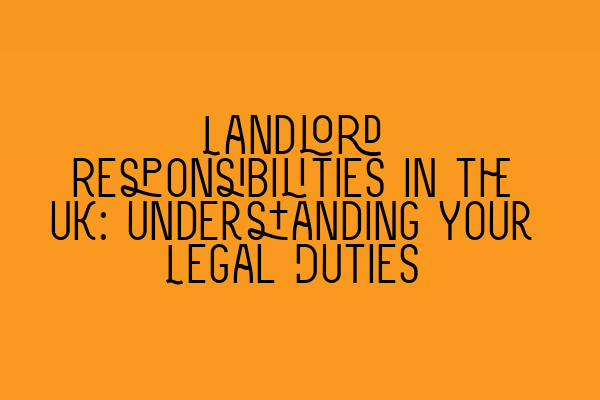Landlord Responsibilities in the UK: Understanding Your Legal Duties
Introduction
Being a landlord can be a rewarding experience, but it also comes with a set of legal responsibilities that must be understood and followed. As a landlord in the UK, it is crucial to have a clear understanding of your legal duties to ensure compliance with the law and to maintain a positive landlord-tenant relationship. In this blog post, we will provide an overview of the key landlord responsibilities in the UK and explain why it is essential to adhere to them throughout your tenure as a landlord. So, let’s dive in!
The Tenancy Agreement
One of the crucial elements of being a landlord is drafting a comprehensive and legally binding tenancy agreement. This agreement outlines the terms and conditions of the tenancy and sets out the rights, responsibilities, and obligations of both the landlord and the tenant. It is essential to ensure that the tenancy agreement is fair, compliant with current laws, and addresses all necessary aspects such as rent amount, payment terms, duration of the tenancy, and any specific clauses or restrictions.
For comprehensive guidance on creating a tenancy agreement that complies with UK laws and protects your interests, check out our related article on SQE 1 Practice Exam Questions.
Maintenance and Repairs
As a landlord, you have a responsibility to ensure that the property you are renting out is safe, habitable, and in a good state of repair. Regular maintenance and prompt repairs of any issues that arise during the tenancy are vital. This includes addressing plumbing and electrical problems, maintaining heating systems, and making sure that the property meets all relevant health and safety regulations.
To familiarize yourself with common maintenance issues faced by landlords and how to handle them effectively, take a look at our article on SQE 1 Practice Mocks FLK1 FLK2.
Health and Safety Compliance
Another key responsibility of a landlord is to comply with health and safety regulations. This means ensuring that the property meets all necessary standards and requirements to ensure the well-being of tenants. This includes providing proper ventilation, maintaining fire safety measures, ensuring the property is free from hazards, and carrying out regular gas and electrical safety checks.
To gain a deeper understanding of your obligations as a landlord in terms of health and safety compliance, our related article on SQE 2 Preparation Courses provides comprehensive guidance.
Deposit Protection
If you take a tenancy deposit from your tenants, you are legally required to protect it in a government-approved tenancy deposit scheme. This protects the tenant’s deposit and ensures that it is handled fairly and returned promptly at the end of the tenancy, provided there are no damages or rental arrears. Failing to protect the deposit can result in severe penalties and potential legal action.
For more information on deposit protection schemes and how to comply with the relevant legal requirements, refer to our article on SQE 1 Preparation Courses.
Right of Entry and Privacy
As a landlord, it is important to respect the privacy and rights of your tenants. While you have the right to access the property to carry out necessary inspections and repairs, this must be done with proper notice and at reasonable hours. Tenants have the right to enjoy their rented property in peace and quiet, so it is crucial to strike a balance between your responsibilities and their privacy.
To understand the rights of both landlords and tenants regarding the right of entry and privacy, consult our article on SRA SQE Exam Dates.
Conclusion
Being a landlord comes with various legal duties and responsibilities that must be understood and adhered to. From creating a comprehensive tenancy agreement to maintaining the property, complying with health and safety regulations, protecting deposits, and respecting the privacy of tenants, it is essential to be well-informed and knowledgeable about your obligations. By fulfilling your legal duties as a landlord, you can ensure a positive and mutually beneficial relationship with your tenants while avoiding potential legal troubles.
For more information and resources on property law and land law, visit SQE Property Law & Land Law.
